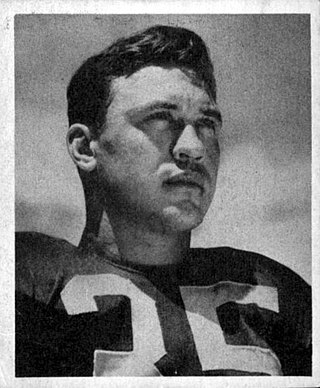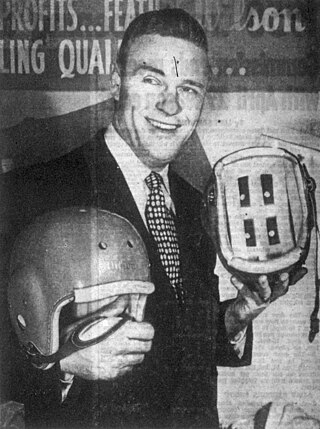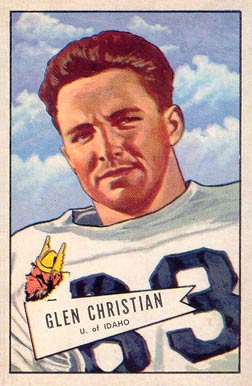 Cameron with the BC Lions in 1957 | |||||||||
| No. 34, 91, 71 [1] | |||||||||
|---|---|---|---|---|---|---|---|---|---|
| Position: | Halfback, defensive back | ||||||||
| Personal information | |||||||||
| Born: | August 17, 1932 Burbank, California, U.S. | ||||||||
| Died: | December 23, 2023 (aged 91) | ||||||||
| Height: | 6 ft 0 in (1.83 m) | ||||||||
| Weight: | 185 lb (84 kg) | ||||||||
| Career information | |||||||||
| High school: | Burbank (Burbank, California) | ||||||||
| College: | UCLA (1950–1953) | ||||||||
| NFL draft: | 1954 / round: 8 / pick: 91 | ||||||||
| Career history | |||||||||
Paul Leslie Cameron (August 17, 1932 – December 22, 2023) was an American professional football player who played for the Pittsburgh Steelers of the National Football League (NFL) and the BC Lions of the Western Interprovincial Football Union (WIFU). He was selected by the Steelers in the eighth round of the 1954 NFL draft. Cameron played college football at the University of California, Los Angeles, where he was a consensus All-American in 1953 and third in Heisman Trophy voting in 1953. He was inducted into the College Football Hall of Fame in 2024. Cameron was a Pro Bowler with the Steelers in 1954 and a WIFU All-Star with the Lions in 1956. ContentsEarly life and collegePaul Leslie Cameron was born on August 17, 1932, in Burbank, California and attended Burbank High School. [1] He played college football for the UCLA Bruins of the University of California, Los Angeles. [2] He was on the Bruins freshman team in 1950 and a three-year letterman from 1951 to 1953. [1] He rushed for 597 yards and passed for 855 yards in 1951, leading the Pacific Coast Conference (PCC) in total offense with 1,428 yards. [2] He was named second-team All-PCC by both the Associated Press and United Press that season. [3] [4] In 1952, he was a consensus first-team All-PCC selection, a Newspaper Enterprise Association first-team All-American, and finished sixth in Heisman Trophy voting. [5] [6] As a senior in 1953, he rushed 134 times for 672 yards and 12 touchdowns, made four interceptions, and also finished third in the country with a 41.3 punting average. [2] Cameron garnered consensus All-American and first-team All-PCC honors for the 1953 season while also finishing third in Heisman voting. [2] [7] [5] Overall, he rushed for 1,451 yards and 19 touchdowns and passed for 1,881 yards and 25 touchdowns during his college career. [2] He set school career records for touchdown passes, total offense with 3,332 yards, and total touchdowns with 44. [2] Cameron was inducted into the UCLA Athletic Hall of Fame as part of its first class in 1984. [2] His no. 34 jersey has also been retired by the school. [2] Professional careerCameron was selected by the Pittsburgh Steelers in the eighth round, with the 91st overall, of the 1954 NFL draft. [8] He officially signed with the team on February 4, 1954. [9] He started all 12 games for the Steelers during the 1954 season, recording seven interceptions for 118 yards and three fumble recoveries. [8] Cameron was named to the 1954 Pro Bowl. [8] He became a free agent after the 1955 season. [9] Cameron then played for the BC Lions of the Western Interprovincial Football Union (WIFU) from 1956 to 1959. [1] He played in 15 games for the Lions in 1956, totaling 82 carries for 430 yards, 16 completions on 35 passing attempts (45.7%) for 199 yards, one touchdown, and four interceptions, 24 receptions for 428 yards and three touchdowns, four interceptions for 142 yards, 20 punts for 926 yards, 14 kick returns for 264 yards, and three fumble recoveries. [1] He was named a WIFU All-Star for his performance during the 1956 season. [10] He appeared in 16 games for the Lions in 1957, accumulating 78 rushing attempts for 514 yards and two touchdowns, 57 passing yards, one passing touchdown, 36 catches for 593 yards and five touchdowns, and six interceptions for 63 yards. [1] Cameron played in 15 games again in 1958, recording 54 carries for 304 yards, 58 receptions for 834 yards and two touchdowns, five interceptions for 137 yards and one touchdown, and five fumble recoveries. [1] He only appeared in one game for the Lions during his final season in 1959, catching four passes for 48 yards. [1] Post-playing careerCamerson served in the United States Army from 1954 to 1956. [2] He worked in the entertainment industry after his football career, including stints with Disney Productions, Tomorrow Entertainment, and Allied Artists. [2] He was also the vice president of production for EMI Television. [2] He was also a member of the Screen Directors' Guild, Encino Property Owners Association and UCLA Scholarship Committee. [2] Cameron died on December 22, 2023. [11] He was inducted into the College Football Hall of Fame in 2024. [2] The National Football Foundation called him "one of the last great single-wing halfbacks". [2] See alsoRelated Research Articles Robert Yale Lary Sr. was an American professional football player, businessman, and politician. He played for 11 seasons as a safety, punter and return specialist for the Detroit Lions of the National Football League (NFL). He was inducted into the Pro Football Hall of Fame in 1979 and was also selected for the NFL 1950s All-Decade Team.  William McGarvey Dudley, nicknamed "Bullet Bill", was an American professional football halfback, safety and return specialist who played in the National Football League (NFL) for the Pittsburgh Steelers, the Detroit Lions, and the Washington Redskins. He was inducted into the Pro Football Hall of Fame in 1966 and the Virginia Sports Hall of Fame in 1972.  Frank Francis Sinkwich Sr. was a Croatian American football player and coach. He won the Heisman Trophy in 1942 while playing for the Georgia Bulldogs, making him the first recipient from the Southeastern Conference. In the course of a brief but celebrated career in professional football, Sinkwich was selected for the National Football League Most Valuable Player Award. He coached the Erie (PA) Vets semi-professional football team in 1949. Sinkwich was inducted into the College Football Hall of Fame in 1954.  Billy Dale Vessels was an American professional football player at the halfback position. He played college football for the Oklahoma Sooners, winning a national championship in 1950 and being awarded the 1952 Heisman Trophy.  John Henry Johnson was an American professional fullback. His first professional stint was in Canada in the Western Interprovincial Football Union for one season with the Calgary Stampeders. He then played in the National Football League (NFL) for the San Francisco 49ers, Detroit Lions, and Pittsburgh Steelers before spending his final season in the American Football League (AFL) with the Houston Oilers. Commonly referred to as simply John Henry, an allusion to the folk hero of the same name, Johnson was a tough and tenacious player who performed at a high level well into the tail end of his career.  Paul Joseph Christman was an American football quarterback. He played college football for the Missouri Tigers and professionally for the Chicago Cardinals and the Green Bay Packers of the National Football League (NFL). He was drafted in the second round of the 1941 NFL Draft by the Cardinals. He was inducted into the College Football Hall of Fame in 1956.  Troy James Smith is an American former professional football quarterback who played in the National Football League (NFL). He played college football for the Ohio State Buckeyes, earning unanimous All-American honors and winning the Heisman Trophy in 2006. He was selected by the Baltimore Ravens in the fifth round of the 2007 NFL draft, and also played for the San Francisco 49ers, the Omaha Nighthawks of the United Football League (UFL), and the Montreal Alouettes of the Canadian Football League (CFL).  Donald LeRoy Doll, also known as Don Burnside, was an American football player and coach.  John Dickerson "Jackie" Parker was an American gridiron football player and coach. He was an All-American in college football and professional football player in the Canadian Football League (CFL), playing the running back, quarterback, defensive back, and kicker positions. He is primarily known for his play with the Edmonton Eskimos. Later in his career, he played for the Toronto Argonauts and the BC Lions and coached the Eskimos and Lions after his playing career ended.  Richard Herbert Alban was an American professional football defensive back who played eight seasons for the Washington Redskins and Pittsburgh Steelers in the National Football League (NFL). Alban played college football at Northwestern University, where he was used at halfback and on defense. James C. Caroline was an American football player in the National Football League (NFL) and Canadian Football League (CFL). He played college football for the Illinois Fighting Illini, where he played as a halfback and was a consensus All-American in 1953. After a year in the CFL with the Toronto Argonauts and the Montreal Alouettes, Caroline played for 10 seasons in the NFL with the Chicago Bears. He was inducted into the College Football Hall of Fame in 1980.  Kenneth Leroy Carpenter was an American football halfback who played for the Cleveland Browns in the National Football League (NFL), the Saskatchewan Roughriders in the Canadian Football League (CFL), and the Denver Broncos in the American Football League (AFL) in the 1950s and 1960. Following his playing career, Carpenter coached during the 1960s in the CFL, NFL and a variety of smaller leagues in the United States.  Robert Driscoll Garrett was an American football quarterback who played for Stanford University and played one season in the National Football League (NFL). He is a member of the Stanford Athletics Hall of Fame. Christopher L. Howard is a former professional American football running back who played in the National Football League (NFL) for the Jacksonville Jaguars. Howard had been drafted by the Denver Broncos in the fifth round of the 1998 NFL draft. His professional football career was haunted by fumble troubles, which caused the Broncos to release him before he played a regular season game for them. Howard began to have fumble problems again when the Jaguars acquired and promoted him to a role as a regular player.  The 1953 Detroit Lions season was the franchise's 24th season in the National Football League. The Lions won their second consecutive and third overall National Football League (NFL) championship. In their fourth year under head coach Buddy Parker, the Lions compiled a 10–2 record during the regular season, outscored opponents 271 to 205, finished in first place in the NFL's Western Division, and defeated the Cleveland Browns 17–16 in the NFL Championship Game at Briggs Stadium in Detroit.  Primo Villanueva is an American former gridiron football player. He played college football at the University of California, Los Angeles (UCLA), leading the led the national championship 1954 UCLA Bruins football team in total offense. He subsequently played for the BC Lions in the Canadian Football League (CFL). After his football career ended, Villanueva became a successful restaurateur in Vancouver, British Columbia. The 1954 UCLA Bruins football team was an American football team that represented the University of California, Los Angeles (UCLA) in the Pacific Coast Conference during the 1954 college football season. They played their home games at the Los Angeles Memorial Coliseum and were coached by Red Sanders. It was Sanders' sixth season as the UCLA head coach; the Bruins finished 9–0 overall, and were Pacific Coast Conference Champions with a 6–0 record. In nine games, UCLA outscored their opponents, 367 to 40. The 1953 UCLA Bruins football team represented the University of California, Los Angeles (UCLA) in the Pacific Coast Conference (PCC) during the 1953 college football season. Led by fifth-year head coach Red Sanders, the Bruins played their home games at the Los Angeles Memorial Coliseum. The team completed the regular season with an 8–1 record for the first of three consecutive conference titles.  Glen Christian is a former Canadian football halfback who played five seasons in the Western Interprovincial Football Union (WIFU) with the Calgary Stampeders and BC Lions. He was selected by the San Francisco 49ers in the ninth round of the 1952 NFL draft. He played college football at the University of Idaho.  Justin Skyler Fields is an American professional football quarterback for the Pittsburgh Steelers of the National Football League (NFL). Following a stint with the Georgia Bulldogs, he played college football for the Ohio State Buckeyes, where he was twice named the Big Ten Offensive Player of the Year and appeared in the 2021 National Championship Game. References
External links
This page is based on this Wikipedia article Text is available under the CC BY-SA 4.0 license; additional terms may apply. Images, videos and audio are available under their respective licenses. | |||||||||